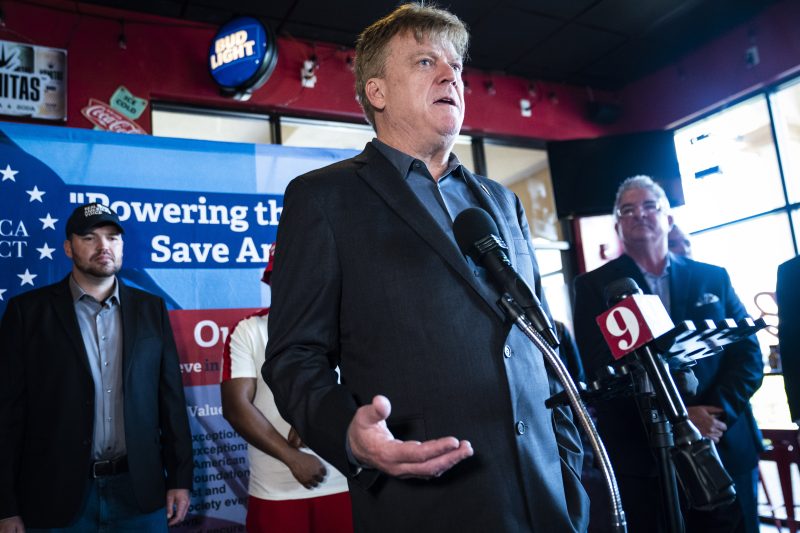An attorney for former Overstock CEO Patrick Byrne was detained at the federal courthouse in Washington on Monday after defending her decision to disseminate internal documents from Dominion Voting Systems in an effort to revive long-debunked claims about the 2020 election.
Stefanie Lambert was facing a bench warrant from a state court in Michigan, where she is accused of taking part in a conspiracy to tamper with voting machines in hopes of finding proof of fraud. She is simultaneously representing Byrne, who is being sued for defamation by Dominion over related falsehoods claiming the firm’s machines enabled vote tampering.
The U.S. Marshals office in a statement confirmed Lambert was arrested on Monday afternoon.
In D.C. court Monday, Lambert admitted that she made public emails she obtained as Byrne’s lawyer and shared them with a southwestern Michigan sheriff who was also investigated as part of that alleged plot. Over 2,000 pages of the documents were put on the social media site X this month by an account using the sheriff’s name and photograph.
Dominion requested Lambert be removed from the case following the release of the documents.
“It has been nearly four years. When does it stop?” Dominion attorney Davida Brook asked in court. She said the company brought suits against Byrne and others “to stop the lies, to end the threats of violence.” Now, she said, Lambert was “using these very lawsuits … to spread yet more lies and do yet more harm.” Dominion employees have received a fresh round of violent threats as a result of the disclosures, Brook said.
Magistrate Judge Moxila A. Upadhyaya said she needed more time to decide whether Lambert should be removed from the case. But the judge said that in the meantime, both Lambert and Byrne could not access to discovery materials, and that Lambert must move to seal the Michigan court document containing Dominion’s records.
After the hearing ended, the other attorneys left while Lambert was asked by the judge to stay behind. Several U.S. Marshals then entered the courtroom and locked the door behind them. Lambert never left through the public courtroom entrance; there is another exit through which detained individuals are transported.
Lambert’s Michigan defense attorney, Daniel Hartman, declined to speak on her whereabouts Monday but said that her failure to appear in court in Michigan “was not willful.” Instead he said it was because of “mixed messages” about whether she had to get fingerprinted while challenging the court’s orders. Just before Lambert appeared in court in D.C., Hartman asked the Michigan judge to reconsider the warrant for her arrest. “To compound onto this entire tragedy, you have an arrest warrant that probably shouldn’t be issued,” he said.
Lambert only recently became Byrne’s lead attorney in Washington, but she said in court that she had been helping with the case since late last year and gained access to the documents sometime “after the holidays.” Given that she had them for weeks, if not months, Upadhyaya asked why Lambert did not file a motion to undo a protective order, which the lawyer signed, barring disclosure of those documents to anyone not involved in the case.
Lambert responded that she was under no obligation to adhere to the protective order because the emails contained “evidence of a crime,” suggesting the situation was analogous to being handed “a dead body” as part of the case discovery. Specifically, she alleged that they were proof that “Dominion conspired with foreign nationals in Serbia” to undermine the U.S. election system. Dominion’s attorneys responded that this was a “xenophobic conclusion” based only on the fact that the company has some overseas employees. A Dominion spokeswoman added in an email that “any allegation that Dominion employees anywhere tried to interfere with any election is flatly false.”
Lambert said in court that she gave only Barry County Sheriff Dar Leaf access to the Dominion case discovery storage, which Brook said totals over a million pages. But Lambert said Leaf shared the documents with other sheriffs and members of Congress. Leaf, who has not been charged in the Michigan case, did not immediately return a request for comment.
Lambert said Byrne shared the documents with “the U.S. Attorney’s Office.” She said she did not know which one; there are nearly 100 U.S. attorneys running federal prosecutors’ offices across the country. Lambert argued that Byrne is “a national intelligence asset” who was entitled to “national security information” with law enforcement. Byrne has claimed he was instructed by the FBI to pursue a romantic relationship with Maria Butina, a Russian national who was convicted of being an unregistered foreign agent in 2019. (Former FBI officials have called Byrne’s claims “ridiculous.”) He did not appear in court Monday; asked about the documents he said by text message, “I’m just a humble concerned citizen.” Upadhyaya said he must be in court for the next hearing on whether his lawyer should face penalties.
Right now, Upadhyaya said, her goal was “to prevent further bleeding” of protected information into the public sphere. “I will deal with the ‘why’ later,” she said. But, she told Lambert, “the analogy of the dead body rings hollow to me.”
Dominion was alerted to the leaks by Byrne’s previous attorney, Robert Driscoll, who told them that he had “asked Ms. Lambert to take immediate steps and reasonable efforts to prevent further disclosure of Confidential Discovery Material.” He added that he “had no advance knowledge” of the disclosure, only learning about it when the documents appeared on social media. One such post had already been viewed over 150,000 times by Monday afternoon, Brook said: “The cat is out of the bag.”
Lambert’s criminal trial is set to begin next month. A trial date has not been set in the Dominion case. The company last year settled a similar suit with Fox News for $787 million dollars, and is also suing former Trump attorneys Rudy Giuliani and Sidney Powell along with the right-wing television station OAN and the pillow businessman Mike Lindell.

